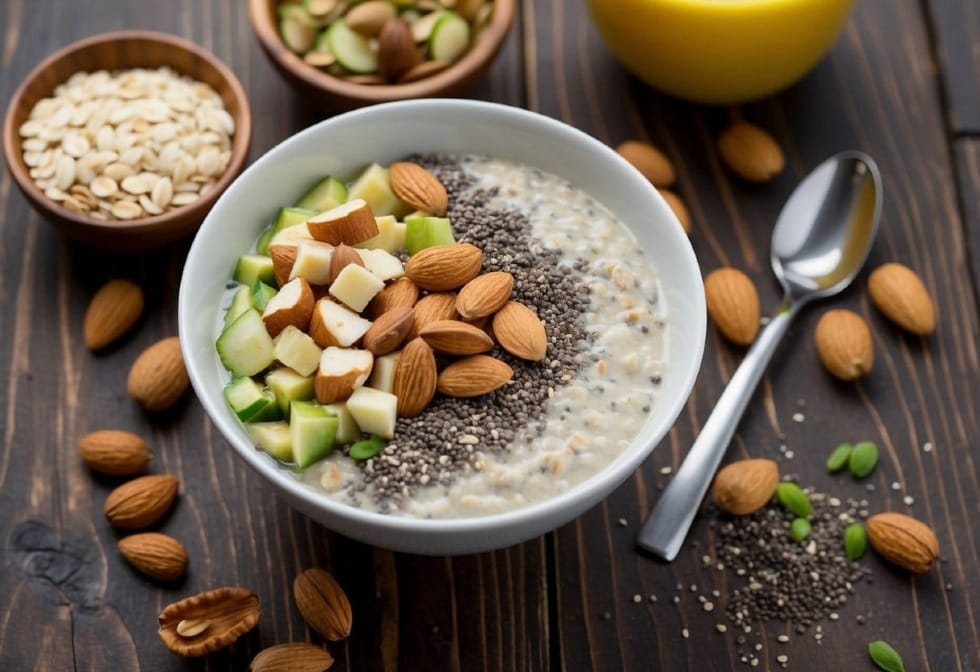Starting your day with a protein-packed vegan breakfast can give you the energy you need to tackle your morning. Many people worry that plant-based diets lack protein, but there are plenty of delicious vegan options that provide just as much protein as animal-based meals.
You can easily get 20-25 grams of protein from vegan breakfast recipes that use ingredients like tofu, chickpea flour, nutritional yeast, and various nuts and seeds. These protein-rich morning meals not only keep you full longer but also provide essential nutrients to support your health goals while following a plant-based lifestyle.
1. Tofu Scramble with Spinach and Avocado
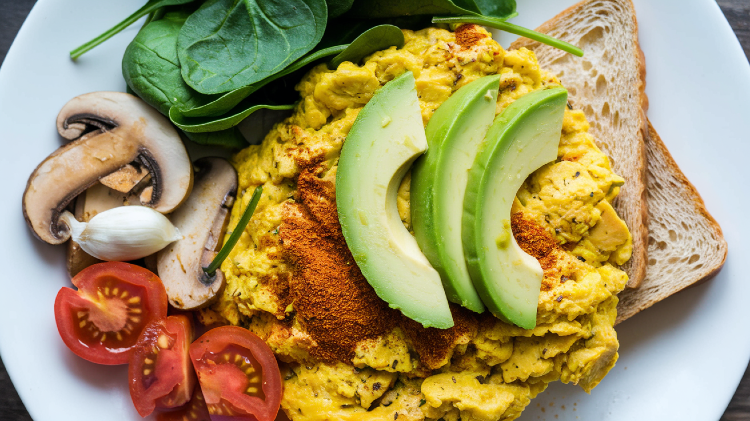
Tofu scramble is a perfect high-protein vegan breakfast that mimics scrambled eggs. This dish uses crumbled firm or extra firm tofu that holds its shape well during cooking.
The basic recipe starts with sautéing your tofu with turmeric for color, nutritional yeast for flavor, and your favorite spices. The yellowish hue of turmeric creates that familiar egg-like appearance.
Fresh spinach adds vital nutrients and a pop of color to your scramble. Simply toss a handful into the pan during the last minute of cooking and watch it wilt perfectly into your dish.
Adding avocado provides healthy fats and creates a creamy contrast to the savory tofu. You can dice it and mix it in or slice it to serve on top of your finished scramble.
For extra flavor, add sautéed mushrooms, garlic, and tomatoes to your scramble. These vegetables complement the tofu beautifully while adding more nutritional value.
This meal packs a serious protein punch, making it ideal for starting your day with sustained energy. One serving typically provides 15-20 grams of plant-based protein.
You can easily meal prep this recipe for busy mornings. Store leftovers in an airtight container for up to 4 days and reheat when needed.
Serve your tofu scramble as-is for an all-protein breakfast or with toast for a more complete meal. It also works wonderfully in breakfast tacos, wraps, or sandwiches.
For the best texture, press your tofu before cooking to remove excess moisture. This helps it crisp up nicely in the pan rather than becoming soggy.
This versatile dish works for any meal of the day, not just breakfast. When you need a quick protein-rich option for lunch or dinner, tofu scramble delivers satisfaction and nutrition.
2. Peanut Butter and Banana Protein Pancakes
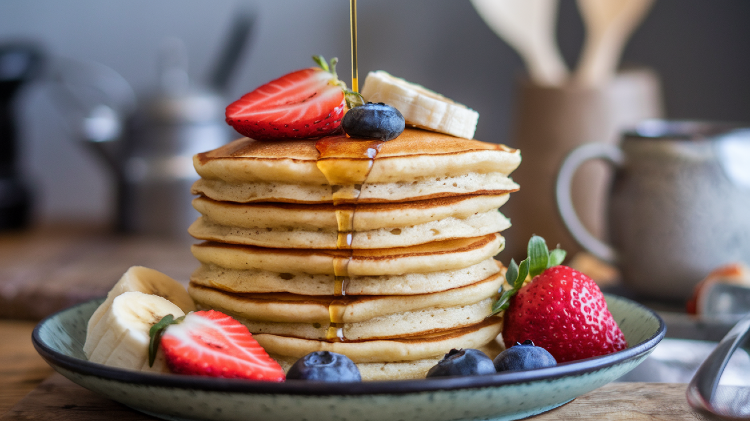
These fluffy vegan pancakes pack a serious protein punch while delivering the classic comfort of a weekend breakfast. They combine the creamy sweetness of bananas with rich peanut butter for a meal that will keep you full until lunch.
To make these pancakes, start by mashing a ripe banana in a large bowl. Add whole wheat flour, plant-based milk, vegan protein powder, peanut butter, maple syrup, baking powder, cinnamon, and a pinch of salt.
Stir everything until you have a smooth batter that's thick but still pourable. The protein powder helps boost the nutritional value without changing the delicious taste.
Heat a non-stick pan over medium heat. Pour about 1/4 cup of batter for each pancake and cook until bubbles form on the surface, about 2-3 minutes.
Flip carefully and cook for another 2 minutes until golden brown. The pancakes should be slightly crisp on the outside and tender inside.
These pancakes offer over 20 grams of protein per serving, making them an excellent post-workout meal. The combination of protein powder and peanut butter creates a filling breakfast that helps maintain steady energy levels.
For toppings, you can add sliced bananas, a drizzle of warm peanut butter, or a light pour of maple syrup. Some people enjoy adding a dollop of plant-based yogurt for extra creaminess and protein.
You can prepare the dry ingredients the night before to save time in the morning. Just mix the wet ingredients in when you're ready to cook.
For variety, try adding chopped walnuts to the batter or a sprinkle of cinnamon on top. These pancakes also freeze well, so you can make a big batch and reheat them on busy mornings.
3. Overnight Oats with Chia Seeds and Almond Milk
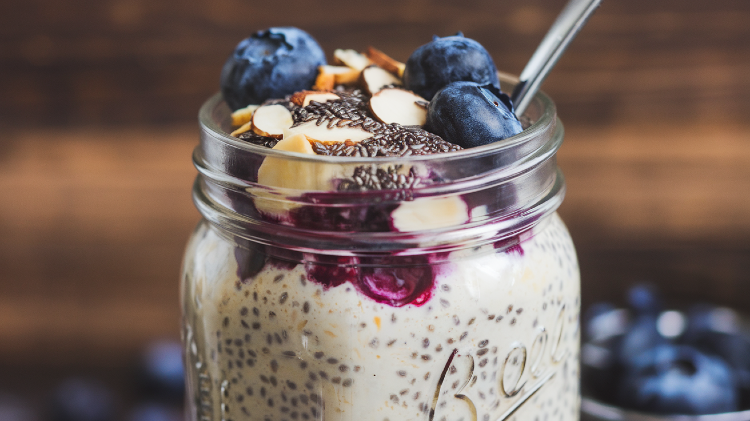
Overnight oats make a perfect high-protein vegan breakfast option that requires minimal effort. By preparing them the night before, you can grab a nutritious meal right from the fridge when you wake up.
The base of this recipe consists of rolled oats mixed with almond milk for a creamy texture. Old-fashioned oats work best as they absorb liquid well without becoming mushy.
Chia seeds are a key ingredient that boosts the protein content while creating a pudding-like consistency. These tiny seeds are packed with protein, fiber, and omega-3 fatty acids.
To make this recipe, combine 1/2 cup of rolled oats with 1 cup of unsweetened almond milk in a jar or container. Add 1 tablespoon of chia seeds and a scoop of plant-based vanilla protein powder.
For sweetness, you can include 1 tablespoon of maple syrup or agave nectar. A dash of vanilla extract and a pinch of salt enhance the flavor profile.
Mix all ingredients thoroughly, ensuring the protein powder dissolves completely. Seal the container and refrigerate overnight or for at least 6 hours.
In the morning, give your oats a good stir. The mixture will have thickened considerably thanks to the chia seeds absorbing the liquid.
You can enjoy your overnight oats cold straight from the fridge. They offer a refreshing and filling start to your day.
For variety, top your oats with fresh fruits like berries or sliced bananas. Adding nuts, seeds, or shredded coconut provides extra texture and nutrients.
This breakfast delivers approximately 18-20 grams of protein per serving, depending on your protein powder. The combination of oats, chia seeds, and protein powder creates a balanced meal that keeps you full until lunch.
4. Chickpea Flour Omelette with Vegetables
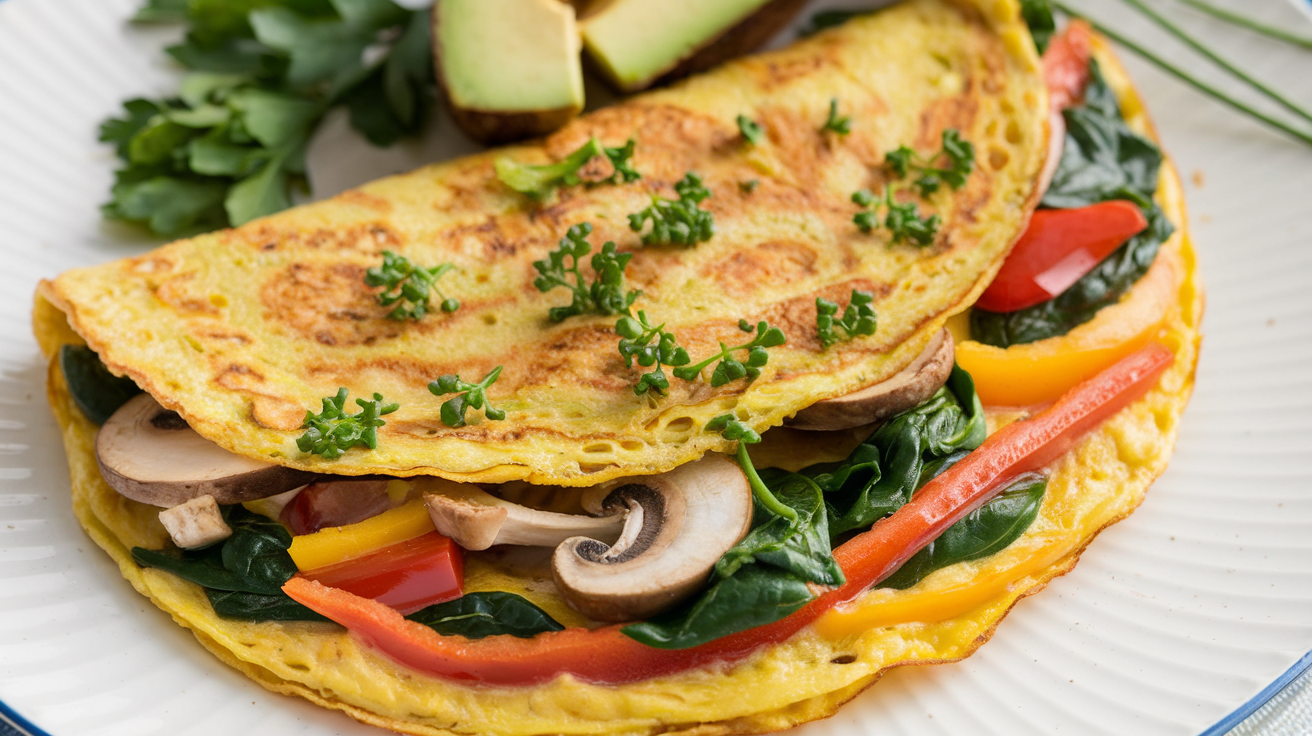
Chickpea flour omelettes are a protein-rich alternative to traditional egg omelettes. They're easy to make and customize with your favorite vegetables.
To make the batter, you'll need 1 cup of chickpea flour, 1 cup of water, 1/4 cup of nutritional yeast, 1/2 teaspoon of turmeric, and 1/2 teaspoon of black salt. The nutritional yeast gives a cheesy flavor, while the black salt adds an eggy taste.
Mix the dry ingredients in a bowl first. Then add half the water and stir until you form a smooth paste before adding the remaining water.
Heat a non-stick pan over medium heat. Pour half the batter into the pan and let it cook for 5-7 minutes until bubbles form on the surface.
While the omelette cooks, prepare your vegetable filling. Good options include bell peppers, spinach, mushrooms, onions, or tomatoes.
Add your vegetables to one side of the omelette once it's partially cooked. Using a spatula, fold the omelette in half to cover the vegetables.
Turn off the heat and cover the pan with a lid. Let it steam for about 5 minutes until completely cooked through.
The finished omelette provides about 7-10 grams of protein per serving. It's also rich in fiber, with 4-5 grams per serving before adding toppings.
Serve your omelette with fresh herbs like parsley or chives. For a complete meal, add avocado slices, toast, or fresh greens on the side.
This breakfast option is not only high in protein but also gluten-free. The chickpea flour provides more protein and fiber than refined wheat flour while being lower in carbs.
5. Quinoa Breakfast Bowl with Berries and Nuts
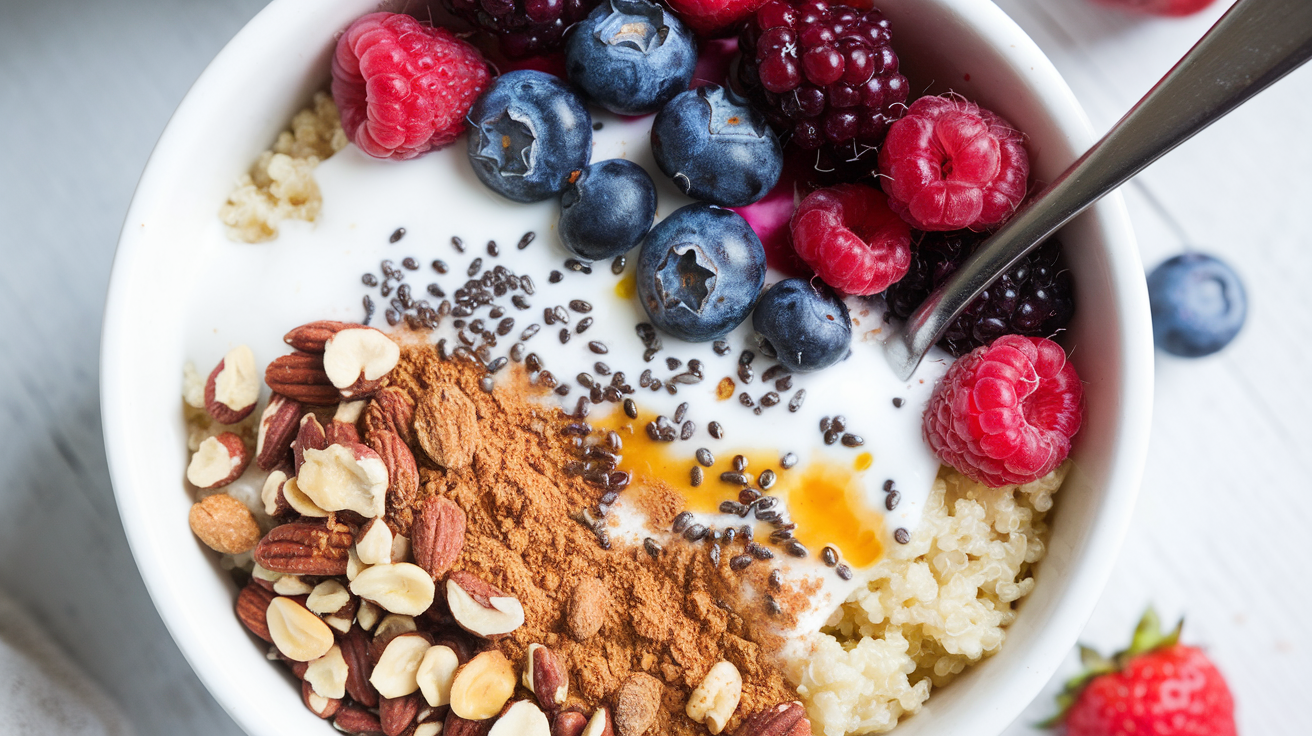
Quinoa makes an excellent base for a protein-packed breakfast. This tiny seed contains all nine essential amino acids, making it a complete protein source for vegans.
To prepare this bowl, start by cooking 1 cup of quinoa according to the package instructions. Let it cool slightly before assembling your breakfast bowl.
Add your cooked quinoa to a bowl and pour in about 1/2 cup of plant-based milk. This adds creaminess and helps bind the ingredients together.
Top your quinoa with a variety of fresh berries. Blueberries, strawberries, and raspberries work wonderfully, providing natural sweetness and antioxidants.
Add a generous handful of mixed nuts for extra protein and healthy fats. Almonds, walnuts, and pecans are excellent choices that complement the quinoa perfectly.
For additional nutrition and crunch, sprinkle some chia seeds or flaxseeds on top. These tiny powerhouses add omega-3 fatty acids and more protein to your breakfast.
You can sweeten your bowl with a drizzle of maple syrup or a sprinkle of cinnamon. Both options add flavor without using refined sugar.
This breakfast bowl is incredibly versatile. You can prepare the quinoa in advance and store it in the refrigerator for quick assembly on busy mornings.
For extra flavor variations, try adding a splash of vanilla extract to your quinoa while cooking. You can also top your bowl with a spoonful of almond butter for more protein and creaminess.
Benefits of a High-Protein Vegan Breakfast
Starting your day with a protein-packed vegan breakfast offers several health advantages. Your body uses this essential nutrient for multiple functions, from building muscle to keeping you full throughout the morning.
Supports Muscle Repair and Growth
Protein is crucial for maintaining and building muscle tissue. When you eat protein-rich vegan foods like tofu, chickpeas, or nutritional yeast, you provide your body with the amino acids needed for muscle repair.
Plant proteins can be just as effective as animal proteins when consumed in adequate amounts. For example, a tofu scramble with nutritional yeast can provide around 25g of protein per serving, similar to animal-based breakfast options.
Athletes and active individuals particularly benefit from high-protein vegan breakfasts. Consuming protein within an hour of waking helps initiate muscle recovery from the previous day's activities.
The combination of different plant protein sources (like chickpea flour with tofu) creates a complete amino acid profile that supports optimal muscle function and development.
Promotes Satiety and Reduces Hunger
High-protein vegan breakfasts keep you feeling full much longer than carb-heavy alternatives. This sustained satiety helps prevent mid-morning snacking and potential overeating later in the day.
Protein takes longer to digest than carbohydrates, which helps stabilize blood sugar levels. This prevents the energy crashes often experienced after consuming sugary breakfast foods.
The fiber content in plant-based protein sources like chickpeas and vegetables adds to the filling effect. For instance, a breakfast with both chickpeas and vegetables provides both protein and fiber for maximum satiety.
Research shows that consuming at least 14-25g of protein at breakfast significantly reduces hunger hormones throughout the morning hours.
Provides Sustained Energy
Unlike simple carbohydrates that cause energy spikes and crashes, protein provides a steady release of energy. This helps you maintain focus and productivity throughout your morning.
When combined with complex carbohydrates and healthy fats, plant proteins create a nutritionally balanced breakfast that fuels your body efficiently. For example, a tofu scramble with vegetables offers protein, fiber, and essential nutrients.
High-protein vegan breakfasts support better cognitive function during morning hours. Your brain needs a steady supply of energy, which protein helps regulate.
Many plant protein sources also contain B vitamins and iron that directly contribute to energy production at the cellular level. Nutritional yeast, often used in vegan breakfast recipes, is particularly rich in energy-supporting B vitamins.
Key Ingredients for Vegan Protein
Building high-protein vegan breakfasts requires knowing which plant foods pack the most protein punch. These powerhouse ingredients can help you reach your daily protein goals without animal products.
Tofu and Tempeh
Tofu is a breakfast protein superstar, containing 10-12 grams of protein per 3.5 ounces (100 grams). Firm and extra-firm varieties work best for scrambles that mimic eggs while adding significant protein.
Crumbled tofu creates a versatile base for breakfast dishes. Try it seasoned with turmeric for color and nutritional yeast for a savory flavor boost.
Tempeh offers even more protein than tofu—about 19 grams per 3.5 ounces. This fermented soybean product has a nutty flavor and chewy texture.
Both options absorb flavors well, making them perfect for breakfast recipes. For best results, press tofu before cooking to remove excess moisture and help it crisp up better.
Legumes and Beans
Chickpeas are breakfast champions, with about 15 grams of protein per cup. Chickpea flour (also called besan) contains around 21 grams of protein per cup, making it perfect for protein-packed pancakes and frittatas.
Black beans provide roughly 15 grams of protein per cup. They work well in breakfast burritos and bowls.
Lentils offer 18 grams of protein per cooked cup. Red lentils cook quickly and can be added to breakfast porridge for a protein boost.
Many of these legumes can be prepared ahead of time. You can batch-cook beans on weekends or use canned versions for convenience on busy mornings.
Nuts and Seeds
Peanuts lead the protein pack with 7.3 grams per ounce. They're technically legumes but are commonly used as nuts in breakfast foods.
Almonds, pistachios, and walnuts contain 5-6 grams of protein per ounce. They make excellent toppings for oatmeal and smoothie bowls.
Chia seeds pack 4.7 grams of protein per ounce and create a pudding-like texture when soaked in liquid. Try them in overnight oats for an easy protein-rich breakfast.
Hemp seeds contain 9.5 grams of protein per ounce—they're tiny nutrition powerhouses! Sprinkle them on toast, blend them into smoothies, or mix them into breakfast bakes.
Nut kinds of butter provide concentrated protein. Two tablespoons of peanut butter contain about 8 grams of protein.
Tips for Increasing Protein Intake
Getting enough protein on a plant-based diet requires strategy and planning. Here are practical ways to boost the protein content in your vegan breakfasts without sacrificing taste or convenience.
Incorporate Protein-Rich Add-Ins
Boost your breakfast's protein content with simple add-ins. Sprinkle 1-2 tablespoons of hemp seeds on smoothie bowls or oatmeal for an extra 7-10g of protein.
Chia seeds are another excellent option, providing about 5g of protein per 2 tablespoons. They work well in overnight oats or as pudding.
Nutritional yeast adds a cheesy flavor to savory breakfasts while delivering 8g of protein per 1/4 cup. Try it on tofu scrambles or mixed into chickpea flour omelets.
Keep nuts and seeds handy. A small handful (1 oz) of almonds adds 6g of protein, while the same amount of pumpkin seeds offers 9g.
Pre-crumbled firm tofu can be quickly added to breakfast wraps, smoothies, or breakfast hash for a substantial protein boost.
Utilize Plant-Based Protein Powders
Plant-based protein powders offer a convenient way to increase protein intake at breakfast. A single scoop typically provides 15-25g of protein.
Look for powders made from:
- Pea protein
- Hemp protein
- Brown rice protein
- Soy protein
- Protein blends (which offer complete amino acid profiles)
Add protein powder to:
- Morning smoothies
- Oatmeal (mix in after cooking)
- Pancake or waffle batter
- Breakfast muffin recipes
- Chia pudding
Choose unflavored varieties for savory recipes. For sweet breakfast items, vanilla or chocolate flavors work well.
Protein powders can sometimes alter texture, so start with small amounts (1/2 scoop) until you find the right balance for your recipes.
Conclusion
Starting your day with a high-protein vegan breakfast provides lasting energy and satisfaction. The five recipes shared offer a variety of flavors while delivering the protein your body needs.
Each recipe can be customized based on your preferences. You can swap vegetables, adjust spices, or change the texture to make these breakfasts uniquely yours.
Incorporating protein-rich plant foods like tofu, chickpea flour, and nutritional yeast helps you meet your daily protein needs. These ingredients not only offer protein but also provide essential nutrients your body requires.
Preparation is key to maintaining a high-protein vegan lifestyle. Consider batch cooking or preparing ingredients ahead of time to make your mornings smoother.
Remember, a balanced breakfast sets the tone for your entire day. By choosing these protein-packed options, you're fueling your body with quality nutrition that supports your health goals.
Try incorporating these recipes into your weekly rotation. Your body will thank you for the sustained energy, muscle support, and satisfaction these breakfasts provide.


